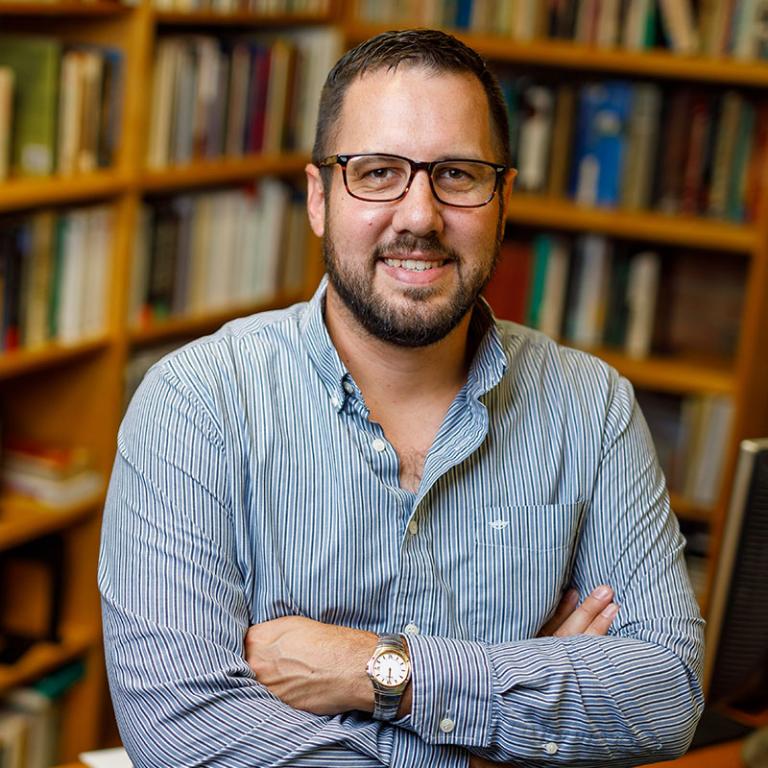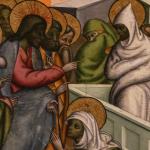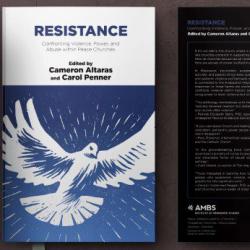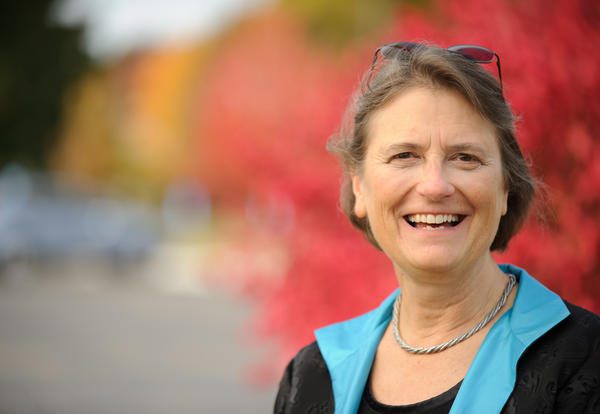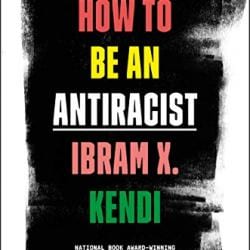People sometimes think that because I’m a pastor, editor, and theologian, I must spend a lot of time reading. The reality is that, because I’m those three things at once, I have precious little time to read outside of work. So when I do read, I want it to be worth it. This means that I’m often doing triage with the books I read: Is this relevant to my teaching or ministry? Does it represent a perspective I don’t often hear from? Is it written by a friend or someone I look up to? And so on.
As it turns out, right now there are a number of books on my shelf that check one or more of those boxes. And this past week I had a much-anticipated vacation that allowed me to do a little catch up. So, while I can’t claim to have completed all of these, I’m going to recommend the following 13 anti-oppression summer reads that are currently on my shelf.
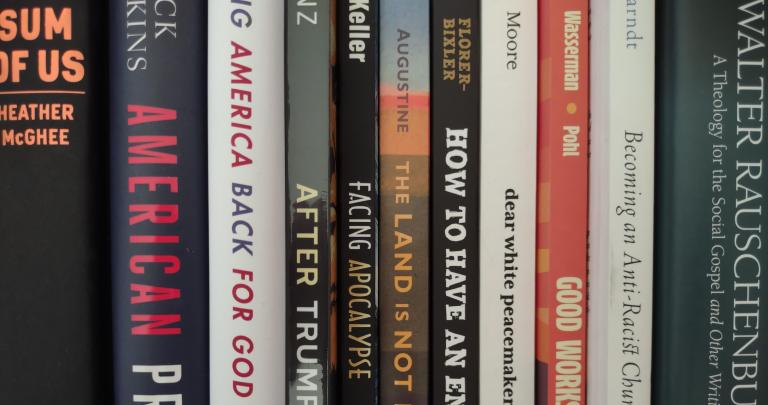
1. Leaving Silence: Sexualized Violence, the Bible, and Standing with Survivors, by Susannah Larry
This book just arrived in the mail today, and I can’t wait to dive in! Susannah Larry is one of 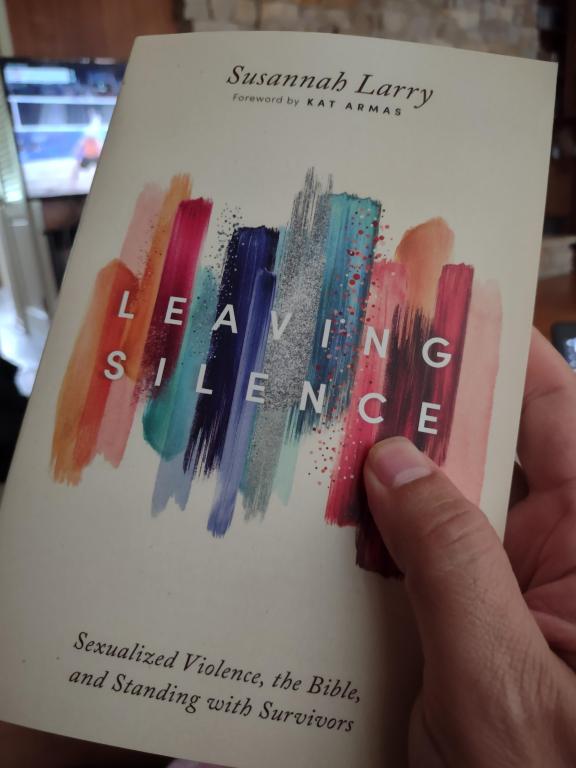 my colleagues at Anabaptist Mennonite Biblical Seminary (AMBS), and I’ve already learned so much from her perspective on Scripture, including when we co-taught on Anabaptist Approaches to Scripture and when she recently preached at Keller Park Church where I pastor. Trust me when I say that this book will be well worth your time.
my colleagues at Anabaptist Mennonite Biblical Seminary (AMBS), and I’ve already learned so much from her perspective on Scripture, including when we co-taught on Anabaptist Approaches to Scripture and when she recently preached at Keller Park Church where I pastor. Trust me when I say that this book will be well worth your time.
Read more and purchase here.
2. The Sum of Us: What Racism Costs Everyone and How We Can Prosper Together, by Heather McGhee
My spouse got me The Sum of Us for Father’s Day. Heather McGhee is a political commentator whose perspective we always appreciate. In this book, she describes how racist public policies have harmed not only people of color but everyone. One example she discusses is how cities across the United States chose to literally drain their public pools instead of complying with federal orders to desegregate. If the pools couldn’t be enjoyed exclusively by white people, then they wouldn’t be enjoyed by anyone. (Of course, whites-only clubs and private pools proliferated following the draining of public pools, so the impact was still disproportionately on people of color and poor whites.)
Read more and purchase here.
3. American Prophets: The Religious Roots of Progressive Politics and the Ongoing Fight for the Soul of the Country, by Jack Jenkins
I follow religion reporter Jack Jenkins on Twitter and always find his perspective interesting. One of his recurring themes is that political progressives are way more religious than people give them credit for. (I can attest personally.) American Prophets provides a book-length treatment of that argument, upending the equation of religious with conservative.
Read more and purchase here.
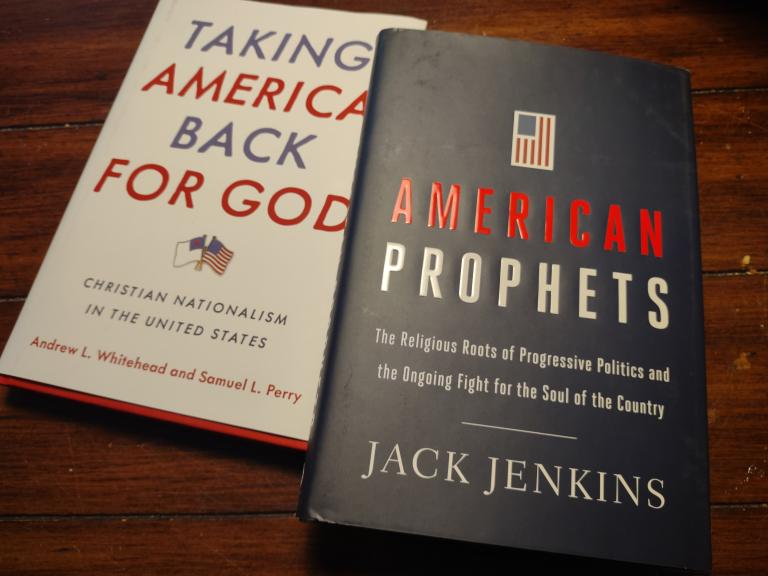
4. Taking America Back for God: Christian Nationalism in the United States, by Andrew L. Whitehead and Samuel L. Perry
I met Andrew Whitehead in youth group our freshman year of high school, and we’ve been the closest of friends ever since. We followed similar religious and academic paths, both landing at Baylor for our PhD programs—him in sociology and me in theology. With fellow sociologist of religion Samuel Perry, Andrew has written the most comprehensive sociological study of Christian nationalists in the United States. What their research shows is that, it isn’t so much evangelicalism or conservativism that accounts for a number of oppressive views: it is specifically Christian nationalism, which is more of a political ideology than it is a particularly religious one. By rooting out Christian nationalism, religious traditions (even evangelicalism) can be movements for liberation instead of oppression.
Read more and purchase here.
5. After Trump: Achieving a New Social Gospel, by Donald Heinz
I was unfamiliar with Donald Heinz and his work until his publicist sent me a copy of his latest book. But since my research emphasis is on Christian social ethics and, in particular, the twentieth-century social gospel and its legacy today, I was intrigued by this title. Heinz argues that social gospel movements have arisen in response to historical injustices: the slave trade, the Gilded Age, and segregation. Now, in the wake of the Trump administration—and wider political movements that go back at least to the 1980s—there is a new opportunity for the church to proclaim a gospel that is both spiritual and social.
Read more and purchase here.
6. Facing Apocalypse: Climate, Democracy, and Other Last Chances, by Catherine Keller
The same publicist who sent me Heinz’s book sent me Catherine Keller‘s latest as well. Keller is a well-known constructive theologian, and in Facing Apocalypse, she reads the Apocalypse (the biblical book of Revelation) from the precipice of a global climate apocalypse. By doing so, she resists both denialism and nihilism, presenting instead a vision of new creation.
Read more and purchase here.
7. The Land Is Not Empty: Following Jesus in Dismantling the Doctrine of Discovery, by Sarah Augustine
A couple years ago, I edited an issue of Vision on the Doctrine of Discovery—or what guest editor Malinda Elizabeth Berry calls America’s originating sin. One name that I kept encountering in discussions on dismantling the Doctrine of Discovery among Mennonites is Sarah Augustine, who is a Pueblo (Tewa) woman as well as a member of Seattle Mennonite Church. Although the Doctrine of Discovery was formulated in the name of Christ, Augustine argues that discipleship to Jesus entails dismantling it in order to live in right relationship to God, neighbor, and the earth.
Read more and purchase here.
8. How to Have an Enemy: Righteous Anger and the Work of Peace, by Melissa Florer-Bixler
In a recent letter to someone I consider a friend, I wrote that, because they are working for people intent on harming me, they are my (temporary) enemy. I don’t think I’d ever written that word to someone, but having just read an advanced copy of my friend and fellow Mennonite pastor Melissa Florer-Bixler‘s latest book, How to Have an Enemy, I’m convinced that we don’t do anyone any good by pretending that they aren’t our enemy when they harm us or people we love. As Florer-Bixler argues, naming someone your enemy is simply the first step in overcoming enmity and thereby becoming friends. When we think of enemies in this way, we find that they aren’t so much over there as they are among us and even within us. While Christians can often rush to paper over our internal differences for the sake of perceived unity, Jesus had a practice of publicly naming his enemies, even or especially from within his own religious group, but he did so not to harm them but to love them. Florer-Bixler calls us to do the same.
Read more and purchase here.
9. Dear White Peacemakers: Dismantling Racism with Grit and Grace, by Osheta Moore
I met Osheta Moore a couple years ago when we were both speaking at the Pastors and Leaders Conference at AMBS, but I’ve known her by reputation and social media for over a decade. Osheta is a Black Christian embedded in some predominantly white spaces, especially among so-called neo-Anabaptists. In Dear White Peacemakers, which I just started reading a couple days ago, she writes a series of letters to us white peacemakers explaining how we can use our privilege to join her in Jesus-centered, anti-racist work.
Read more and purchase here.
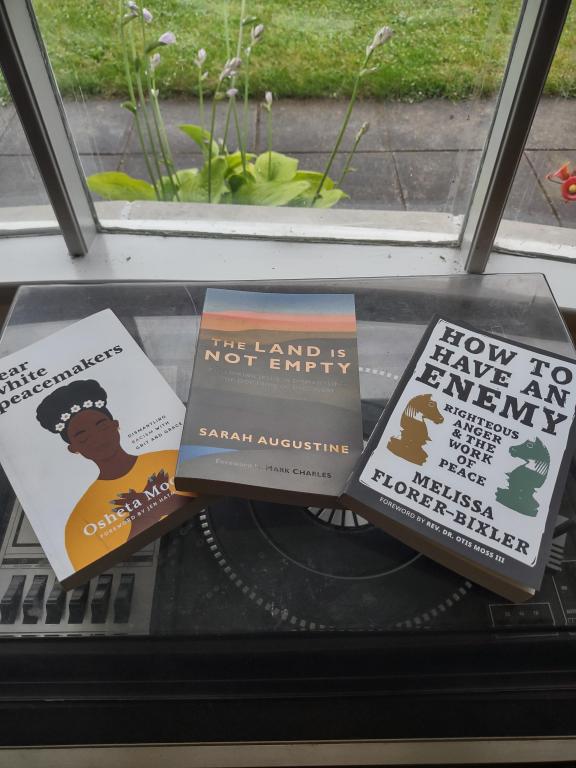
10. Good Works: Hospitality and Faithful Discipleship, by Keith Wasserman and Christine D. Pohl
My friend Drew Strait just gave me a copy of Good Works, for which he wrote a blurb. I’ve long appreciated Christine Pohl‘s work on hospitality, and I’m just learning about Keith Wasserman through this book. But since I’ve just cracked the book, I’ll leave you with Drew’s endorsement: “As theorists and practitioners of Christ’s radical hospitality, Keith Wasserman and Christine Pohl draw on their years of experience writing about and living in community to animate the relationship between good works, hospitality, and God’s justice-making mission. This is crucial reading for pastors, organizers, and all who desire to build ‘heroic communities’ of God’s peace on earth.
Read more and purchase here.
11. Becoming an Anti-Racist Church: Journeying toward Wholeness, by Joseph Barndt
I wasn’t familiar with Joseph Barndt until I fortuitously stumbled on this book in AMBS’s library. Published in 2011, Becoming an Anti-Racist Church was saying a decade ago what many white Christians are only beginning to recognize in the wake of the Black Lives Matter movement: that being non-racist isn’t enough; we must be committed to becoming anti-racist. Barndt describes the struggle between racists and anti-racists historically and presently (during the Obama era) before offering a vision for a future anti-racist church.
Read more and purchase here.
12. Walter Rauschenbusch: Published Works and Selected Writings, 3 vols., edited by William H. Brackney
In many ways, Walter Rauschenbusch is the OG anti-oppression Christian, as one of the leaders of the social gospel movement at the beginning of the twentieth-century. Although he failed to see the intersectional connections between class, race, and gender, he addressed the class struggle in the United States head on with his classics Christianity and the Social Crisis (1907), Christianizing the Social Order (1912), and A Theology for the Social Gospel (1918). Now these works and many more have been collected and published together in three volumes as Walter Rauschenbusch: Published Works and Selected Writings. Since Rauschenbusch was one of three figures I wrote my dissertation on, I had read most of his major writings, so I mostly got this book for the introductions by William Brackney and David Gushee. While these introductions offer extensive background and analysis of Rauschenbusch’s work, I wish at least one of the volumes included an introduction by a woman or person of color who could have addressed the impact of Rauschenbusch’s at times oppressive views of gender and race.
Read more and purchase here, here, and here.
13. The Making of Biblical Womanhood: How the Subjugation of Women Became Gospel Truth, by Beth Allison Barr
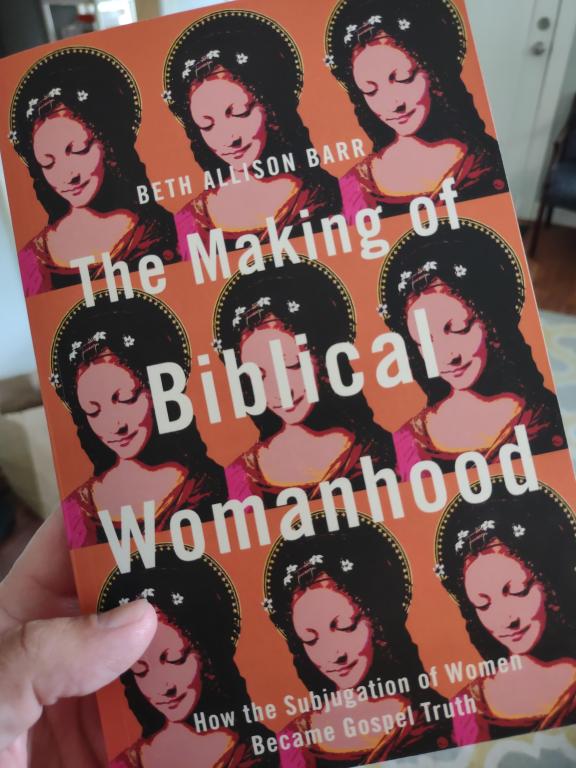 I picked this book up at the start of the summer and read it cover-to-cover in just a few sittings. My initial reaction to this book was sadness. Sadness that so many women, even accomplished historians like Beth Allison Barr, remain trapped in oppressive church cultures. Barr got out of her oppressive Southern Baptist Church context, even at the expense of her husband’s job as a pastor, and she writes out of her own experiences of subjugation and out of her research into the historical connections between Christianity and women’s subjugation. Ultimately, even though parts of the book are depressing, the book is hopeful, as it provides a vision of flourishing for women and all people in the church.
I picked this book up at the start of the summer and read it cover-to-cover in just a few sittings. My initial reaction to this book was sadness. Sadness that so many women, even accomplished historians like Beth Allison Barr, remain trapped in oppressive church cultures. Barr got out of her oppressive Southern Baptist Church context, even at the expense of her husband’s job as a pastor, and she writes out of her own experiences of subjugation and out of her research into the historical connections between Christianity and women’s subjugation. Ultimately, even though parts of the book are depressing, the book is hopeful, as it provides a vision of flourishing for women and all people in the church.
Read more and purchase here.
That’s my list right now. What else should I be reading? Drop me your recommendations in the comments section.

